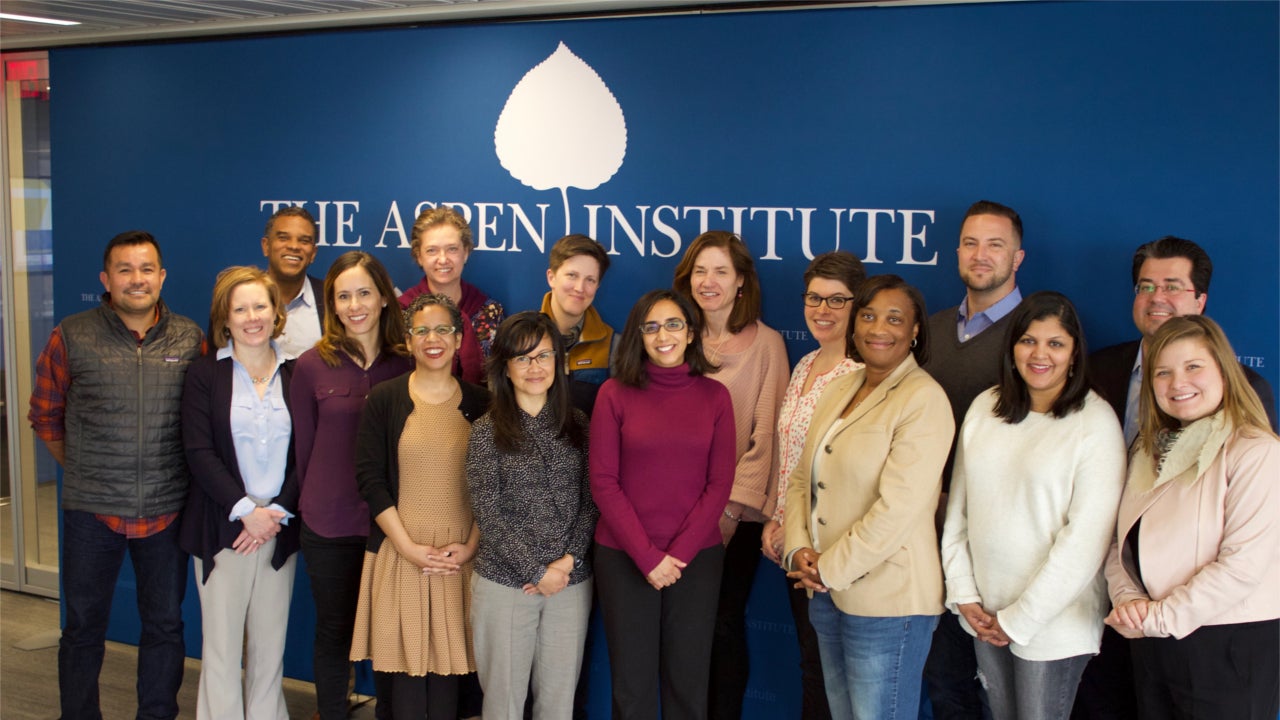Job Quality Fellow, Class of 2017-18
Director, Job Quality Initiative
Federal Reserve Bank of Boston

Describe the Federal Reserve Bank of Boston’s strategy of “upgrading jobs.”
In the past, our strategy for increasing workers’ economic opportunity tended to focus on education and training as a pathway to middle class jobs. This strategy is often referred to as “upskilling workers.” Over the past few decades, however, our economy has become more polarized. Middle class jobs are disappearing as low-wage work continues to grow. It has become increasingly clear to us that we need to focus not just on upskilling workers, but also on ensuring that there are more good jobs available to workers. We call this a strategy of “upgrading jobs.” It’s focused on what businesses, government, and other types of organizations can do to improve the quality of jobs that currently exist and are growing.
I work in the Federal Reserve Bank of Boston’s Regional and Community Outreach department, which is committed to working with a variety of actors to improve job quality for low-income workers across New England. We think about job quality not only in terms of wages and benefits, including healthcare, retirement and paid leave, but also consider income stability and other conditions of work, such as worker schedules, worker voice and engagement, and whether workers feel valued in their roles. My team’s job quality initiative at the Boston Fed is an effort to ensure that the jobs that are available across New England, both now and in the future, are of sufficient quality so that all workers can provide for their basic needs and lead lives of dignity.
How is your team working to improve job quality?
We’re taking several approaches to improve job quality across New England. These include conducting and highlighting economic research, sharing perspectives and strategies from individuals on the ground, working directly with businesses, and encouraging the investment community to play a role in incentivizing higher quality jobs.
As a research institution, we produce and elevate research with the goal of informing policies that affect job quality. We convene policymakers on specific topics and policy proposals that are relevant to job quality. For instance, with many states considering $15 minimum wage proposals, we published an issue brief titled “Who earns less than $15 per hour in New England?” This study found that a third of all workers in New England fall into this category, many of whom work full-time and are the primary breadwinners for their families. This helped to dispel the myth that most low-wage workers are teenagers who are just working to get extra spending money. We also recently held a symposium and published an issue brief on paid family and medical leave to inform policymakers, business leaders, worker advocates, and community groups about the impact these policies have on businesses, labor force participation rates, and workers and families, with guidance on how to most effectively structure such policies.
We also feature the perspectives and strategies of businesses, organizations and workers on various aspects of job quality through our online magazine, Invested. Through interview-based features, we hope readers will get a better sense of the scope of the challenges low-wage workers face and the many ways that businesses, community organizations, and individuals can address these challenges and create better jobs. Our first issue of the magazine focused on the challenge of unpredictability in work scheduling, and the second issue centered on worker voice and strategies for engaging workers and involving them in decisions around growing and sustaining businesses.
We also recognize the importance of partnering with employers, financial institutions and workforce service providers in our efforts to improve job quality. We have started encouraging financial institutions and workforce leaders, including heads of chambers of commerce and training-focused organizations, to think not only about the number of jobs their programs support, but also about the quality of these jobs. Over the past two years, we have held roundtable discussions with financial institutions, community groups, workforce development organizations, and business organizations to talk about the roles they can play in improving job quality. We have featured several community development financial institutions that are leading the way on job quality, each through a different mechanism — for instance, by tracking the quality of jobs their investments yield, by incorporating job quality standards in their loan agreements, and by encouraging their clients to take steps that will improve job quality in ways that benefit both workers and businesses.
Tell us about the partnership the Federal Reserve Bank of Boston has formed with Commonwealth Corporation.
One of the projects I am most excited to be working on has blossomed over the course of the Job Quality Fellowship. My team at the Federal Reserve Bank of Boston will be partnering with Job Quality Fellow J.D. LaRock, his organization Commonwealth Corporation, and the Massachusetts Executive Office of Labor and Workforce Development on a state-level project to involve businesses more directly in efforts to improve job quality.
Our goal through this joint initiative is to support Massachusetts businesses in advancing strategies that improve job quality in a way that is sustainable for business. In the first phase of the project, we plan to engage a wide variety of businesses to better understand the challenges they face when trying to improve job quality, where opportunities exist to improve jobs, and the types of tools and technical assistance that could be useful to businesses seeking to improve job quality. The second phase of the project will involve supporting and working more closely with businesses interested in taking concrete steps to improve the quality of the jobs they provide.
In our current tight labor market, we believe that many employers are interested in taking steps, and many have already taken steps, to provide higher quality jobs that attract and retain employees. As we support businesses to develop new practices, we hope to better understand how these changes can positively benefit both workers and companies.
What do you hope to learn and achieve through the Job Quality Fellowship?
I hope that we can amplify the efforts of all Fellows so that the sum of our work is greater than each of us acting alone. Our partnership with Commonwealth Corporation is a great example; by working with Commonwealth Corporation and the Executive Office of Labor and Workforce Development, we will be able to have more impact and engage employers in a more meaningful way. I am also using the Boston Fed’s platform to elevate other examples of Fellows’ work through our online magazine, research publications, and convenings.
What makes this fellowship so unique and special is that it brings together leaders from a wide variety of sectors and backgrounds — employers, government agencies, financial institutions, workforce development organizations, educational institutions, unions and worker advocacy groups. We are all trying to address the same problem while each coming from our own vantage point and with different tools in our toolbox. Making a real dent in improving job quality and creating a society where both businesses and workers can thrive will take effort from, and partnership with, many different actors. I’m grateful for the opportunity to learn from each of my co-Fellows about their approaches to improving job quality, both big and small, and to share what I learn with other organizations in New England and with my colleagues in the Federal Reserve System.
Share now
Tweet “We need to focus not just on upskilling workers, but also on ensuring that there are more good jobs available to workers.” -Anjali Sakaria
Tweet “Making a real dent in improving job quality and creating a society where both businesses and workers can thrive will take effort from, and partnership with, many different actors.” -Anjali Sakaria
Tweet “We hope readers will get a better sense of the scope of the challenges low-wage workers face and the many ways that businesses, community organizations and individuals can address these challenges and create better jobs.” -Anjali Sakaria
Keep in touch
Learn how the Aspen Institute Economic Opportunities Program is helping low- and moderate-income Americans connect to and thrive in a changing economy. Follow us on social media and join our mailing list to stay up-to-date on publications, blog posts, and other announcements.
We are grateful to the Ford Foundation and The Prudential Foundation for their support of this work.
